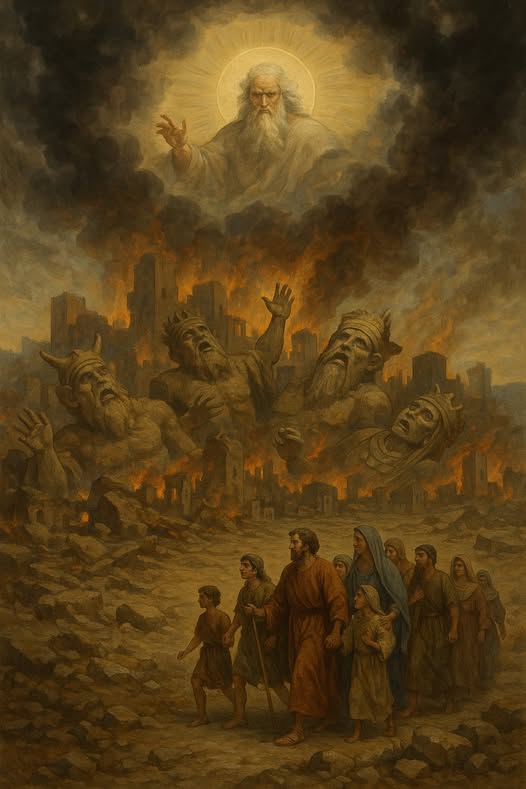
In 1177 BC, a storm of catastrophe swept across the great powers of the Ancient Near East. Empires disintegrated, cities burned, and international trade ground to a halt. The Hittites vanished, Egypt retreated, and the Canaanite city-states collapsed. Historians see climate shifts, famines, earthquakes, and mysterious invaders. But through a biblical-theological lens, a larger story emerges.
The nations that fell were not just human governments. They were spiritual territories under the rule of divine beings who had rebelled against Yahweh. These lesser Elohim, once appointed to steward the nations after Babel, had turned corrupt. Their downfall was not merely geopolitical. It was a cosmic eviction. In their place, Yahweh was preparing the land for His chosen people, Israel, to take hold.
The Nations and Their Gods After Babel
According to Deuteronomy 32:8–9, when Yahweh scattered the peoples at Babel, He divided the nations according to the number of the “sons of God.” These spiritual beings, members of the divine council, were given authority over the nations. But Psalm 82 reveals that they rebelled. Instead of ruling with justice, they led their nations into darkness, idolatry, and oppression. Yahweh summons them to judgment, declaring that though they are Elohim, they will die like mortals.
These were not imagined deities or powerless idols. They were real spiritual beings with territorial influence. These gods became adversaries by failing in their divine stewardship. The empires they empowered mirrored their rebellion. Canaan, Egypt, Hatti, and Ugarit were not spiritually neutral. They were domains of divine rebels, set in opposition to Yahweh and His purposes.
The Collapse of 1177 BC
In the late 13th and early 12th centuries BC, the entire Eastern Mediterranean fell into chaos. The Hittite Empire crumbled. Egyptian control over Canaan disintegrated. Cities from Greece to the Levant were destroyed or abandoned. The reasons are debated, including drought, famine, earthquakes, and invasions, but the result was clear. The structures of the old order collapsed in a cascading failure.
To a biblical observer, this would not be a coincidence. This was judgment. Yahweh was not only bringing down corrupt human empires, He was also stripping power from the rebellious divine beings behind them. Their rule had brought injustice, bloodshed, and spiritual corruption. Now their thrones were being overturned.
Making Space for Israel
Into this vacuum stepped a people without a centralized government or professional military. Israel had emerged from the wilderness as a tribal confederation under Yahweh’s leadership. Their warriors were drawn from each tribe, not trained as standing armies or equipped with chariots like their imperial neighbors. Their military success depended not on numbers or technology, but on faithfulness to Yahweh and His covenant.
Under normal conditions, Israel would have had no chance of taking the land. The Egyptian garrisons, Hittite strongholds, and fortified Canaanite cities would have repelled any attempt. But the collapse of 1177 BC changed the equation. Egypt withdrew. The Hittites disappeared. The rebel gods’ influence fractured. Canaan became a broken landscape, no longer shielded by imperial power.
Yahweh was reclaiming territory. The nations He had once allotted to the sons of God were now being approached again. This time, it was not by rebellious spirits, but by a people formed in covenant with the Most High. The conquest of Canaan was not just a migration. It was the beginning of a cosmic reversal.
A Pattern of Divine Realignment
Scripture shows that Yahweh often advances His purposes through the rise and fall of nations. He used the plagues to bring down Egypt. He used Assyria to discipline Israel, Babylon to purify Judah, and Cyrus to restore the exiles. He raised up Pharaoh to show His power and cast him down. He brought Christ into the world during the Pax Romana, when roads, language, and peace made the Gospel’s rapid spread possible.
The year 1177 BC fits this pattern. It was not random. It was a strategic dismantling of a rebellious world order. Yahweh was not only clearing land for Israel. He was dismantling the corrupt thrones of lesser Elohim who had ruled unjustly. It was the first step in a long campaign to reclaim the nations for Himself.
Conclusion
The Bronze Age collapse was not merely a historical tragedy. It was a cosmic upheaval. The gods of the nations were judged, and their empires were shattered. The land was cleared, not just for occupation, but for restoration. Into that space stepped Israel, not as an ordinary nation, but as Yahweh’s inheritance. They were chosen to carry His name, preserve His word, and prepare the world for the coming of the Messiah.
What appeared to be chaos was in fact the providential beginning of a new order. Yahweh’s kingdom had begun to take root, and the stage was set for redemption to unfold.
Discussion Questions
- How does understanding the divine rebellion after Babel reshape our view of Israel’s rise in Canaan?
- In what ways does Psalm 82 portray Yahweh’s relationship to the other gods and their failure?
- What does the fall of the Bronze Age empires tell us about Yahweh’s long-term strategy for reclaiming the nations?
- How does this event compare to other moments in biblical history when Yahweh used global upheaval for His purposes?
- How should we understand modern global crises in light of Yahweh’s sovereignty over nations and spiritual powers?
Want to Know More?
- Eric H. Cline – 1177 B.C.: The Year Civilization Collapsed
A leading historical work documenting the causes and consequences of the Late Bronze Age collapse across the Near East. - Michael S. Heiser – The Unseen Realm
A foundational text exploring the biblical worldview of divine beings, territorial spirits, and the divine council’s role in history. - Kenneth A. Kitchen – On the Reliability of the Old Testament
A thorough defense of Israel’s historical emergence in the context of Late Bronze and early Iron Age upheavals. - John H. Walton – The Lost World of the Israelite Conquest
Reexamines Israel’s entrance into Canaan, arguing it was not imperial conquest, but a theological mission shaped by Yahweh’s purposes. - K. Lawson Younger Jr. – Ancient Conquest Accounts
A comparative study of biblical and Ancient Near Eastern conquest literature, revealing how Israel’s story fits the broader cultural moment.




